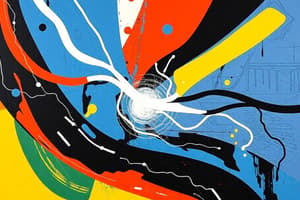Podcast
Questions and Answers
What does Lenz's Law state regarding induced current?
What does Lenz's Law state regarding induced current?
- The induced current only occurs in superconductors.
- The induced current reinforces the change in the magnetic field.
- The induced current has no relation to magnetic fields.
- The induced current opposes the change in the magnetic field causing it. (correct)
Which energy source is NOT typically associated with power generation?
Which energy source is NOT typically associated with power generation?
- Nuclear fusion (correct)
- Wind power
- Hydropower
- Solar power
What is a key advantage of Alternating Current (AC) over Direct Current (DC)?
What is a key advantage of Alternating Current (AC) over Direct Current (DC)?
- AC requires more complex components for circuit operation.
- AC flows in only one direction.
- AC can be easily stored in batteries.
- AC is more efficient for long-distance power transmission. (correct)
Which of the following correctly describes the function of transformers in electrical circuits?
Which of the following correctly describes the function of transformers in electrical circuits?
Which energy source utilizes heat from beneath the Earth’s surface?
Which energy source utilizes heat from beneath the Earth’s surface?
What is the role of a Ground Fault Circuit Interrupter (GFCI)?
What is the role of a Ground Fault Circuit Interrupter (GFCI)?
Which statement about series circuits is true?
Which statement about series circuits is true?
What does Kirchhoff's Current Law state?
What does Kirchhoff's Current Law state?
What is electromagnetism primarily concerned with?
What is electromagnetism primarily concerned with?
When working on electrical circuits, which procedure is crucial for safety?
When working on electrical circuits, which procedure is crucial for safety?
What principle does Faraday's Law describe?
What principle does Faraday's Law describe?
In parallel circuits, what remains the same across all components?
In parallel circuits, what remains the same across all components?
What distinguishes AC from DC power?
What distinguishes AC from DC power?
Flashcards
Lenz's Law
Lenz's Law
The induced current opposes the change in the magnetic field causing it.
Magnetic Force Dependence
Magnetic Force Dependence
Magnetic force depends on the strength and relative direction of magnetic fields.
AC Power Transmission
AC Power Transmission
Alternating current is used for efficient long-distance power transmission.
Direct Current (DC)
Direct Current (DC)
Signup and view all the flashcards
Purpose of Transformers
Purpose of Transformers
Signup and view all the flashcards
Electric Current
Electric Current
Signup and view all the flashcards
Voltage
Voltage
Signup and view all the flashcards
Resistance
Resistance
Signup and view all the flashcards
Ohm's Law
Ohm's Law
Signup and view all the flashcards
Series Circuit
Series Circuit
Signup and view all the flashcards
Parallel Circuit
Parallel Circuit
Signup and view all the flashcards
Circuit
Circuit
Signup and view all the flashcards
Electromagnetism
Electromagnetism
Signup and view all the flashcards
Study Notes
Electricity
- Electricity is the flow of electric charge.
- Electric charge is a fundamental property of matter. It can be positive or negative.
- Electric current (measured in amperes) is the rate of flow of electric charge.
- Voltage (measured in volts) is the electric potential difference between two points, driving the current.
- Resistance (measured in ohms) opposes the flow of current.
- Ohm's Law states: Voltage = Current × Resistance (V = IR).
- Conductors allow electric current to flow easily.
- Insulators impede the flow of electric current.
- Semiconductors have conductivity between conductors and insulators, often used in electronic devices.
Electrical Safety
- Electrical hazards can cause injury or death.
- Electric shock occurs when current passes through the body.
- Ground fault circuit interrupters (GFCIs) detect imbalances in current flow and quickly shut off power to prevent electrocution.
- Working with electricity requires proper safety procedures.
- Never work on electrical circuits while power is on.
- Properly insulated tools and equipment are essential.
- Proper lockout/tagout procedures must be followed during maintenance work.
- Stay away from exposed wires or damaged electrical equipment.
- Know the location of circuit breakers and how to use them.
- Familiarize with arc flash hazards.
Circuit Theory
- A circuit is a closed path for electric current to flow.
- Series circuits have components connected in a single path. Current is the same through each component; total resistance is the sum of individual resistances.
- Parallel circuits have components connected across multiple paths. Voltage is the same across each component; inverse of the total resistance is the sum of the inverse of individual resistances.
- Kirchhoff's Voltage Law states that the sum of voltage drops around any closed loop in a circuit equals zero.
- Kirchhoff's Current Law states that the sum of currents entering a junction in a circuit equals the sum of currents leaving the junction.
- Understanding capacitor and inductor behavior in circuits is crucial.
Electromagnetism
- Electromagnetism is the interaction between electricity and magnetism.
- Electric currents produce magnetic fields; moving magnets can produce electric currents.
- Solenoids and electromagnets utilize this interaction to create controlled magnetic fields.
- Faraday's Law describes how a changing magnetic field induces an electromotive force (voltage) in a conductor.
- Lenz's Law states that the direction of the induced current opposes the change in the magnetic field causing it.
- Magnetic force is dependent on the strength of both magnetic fields and the relative direction of the magnetic fields.
Power Generation
- Power generation involves converting various energy sources into electrical energy.
- Fossil fuels (coal, natural gas, oil) are common sources, but can be environmentally damaging.
- Nuclear power generates electricity from nuclear fission.
- Hydropower uses the potential energy of water.
- Solar power uses photovoltaic cells to convert sunlight into electricity.
- Wind power uses wind turbines to convert kinetic energy of wind into electricity.
- Geothermal energy utilizes heat from the Earth.
- Power plants transform the primary energy source into electrical energy.
AC vs DC
- Direct Current (DC) flows in one direction.
- Alternating Current (AC) periodically reverses direction.
- AC is commonly used for power transmission due to its efficiency in long-distance transmission.
- DC is used in batteries, electronic devices and other applications where constant current and voltage are needed.
- Transformers are used to quickly change voltage for AC circuits.
- DC circuits require different components like rectifiers to convert to AC or vice-versa.
Studying That Suits You
Use AI to generate personalized quizzes and flashcards to suit your learning preferences.




